All of our rare
and heirloom seeds are public domain, open-pollinated, non-hybrid and chemically
untreated. No chemicals, unstable hybrids, patented or genetically
engineered seeds! |
Why should you grow "heirloom"
tomatoes?
If you love
tomatoes, you probably already have a lot of good reasons for raising your
own. If you don't like the taste of tomatoes, perhaps you have
actually never
tasted a good one!
Commercially
grown tomatoes are both a blessing and a curse to the home gardener. The goals and objectives of commercial food producers and those of home gardeners
are quite different.
Along with
breeding for traits that are beneficial like disease resistance,
commercial breeding programs focus on traits such as skin thickness,
consistent maturity, delayed ripening, etc. If you notice a pattern
here, these are traits that are important for growing large scale,
harvesting at one time, and transporting long distances to processing
plants and distribution houses. Taste and nutritional value are
secondary traits in this scenario.
Small
market growers (like the folks you should buy from locally or at Farmer's
Markets) and home gardeners have a different agenda when raising tomatoes
and other produce. We typically want the freshest, best tasting and
most nutritious food we can muster. We also don't want it all coming
fresh at the same moment but instead, spread out over the growing season.
The
commercial seed industry caters to where the money is and that is in big
scale agriculture. Most university and private seed company breeding
programs are now focused on this market. And since they are the
suppliers to the main stream seed industry, these are the same varieties
that are available to the large packet seed companies.
Fortunately,
small companies like the Victory Seed Company are working against this
trend. They continue to work to
maintain the quality and availability of old tried and true
varieties. Some varieties originated as family heirlooms, while others
are good old, classically bred, commercial releases.
Click
here for a great selection of our tomato varieties at the Victory Seed
Company.
|
A
Pictorial of Commercial Tomato Harvesting
Images
courtesy of Oregon
State University
(http://food.oregonstate.edu/v/tomato.html) |
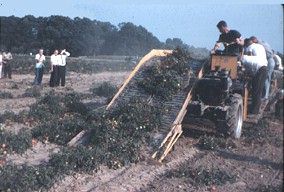 |
One
trait that is important is that the fruit is all at the same stage
of maturity at the same time. Since mechanical harvesting
involves removing the whole plant, selective picking is not an
option. Commercial breeds are also determinate or compact in
growing habit. |
| Here
is another tomato harvester. Notice the stage of ripeness
the fruit are at. Is it any wonder why the fruits from your
garden taste better? |
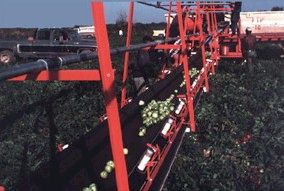 |
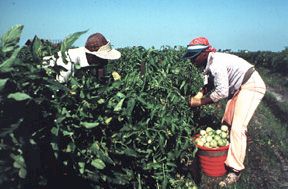 |
Not
everyone has the hundreds of thousands of dollars to spend on
mechanical harvesting equipment. But even when the
commercial operation involves hand picking, the fruit is still green
harvested. |
| From
bucket to bin. Don't try this with heirloom tomatoes.
Now you know why it is important for commercial varieties to have
thick hides! |
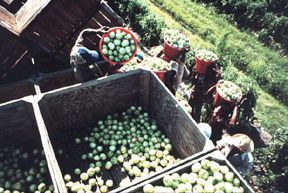 |
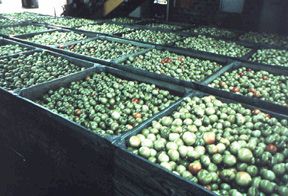 |
Another view of the bins. This time full. Imagine the
weight on the fruits at the bottom. From here, the fruit is
either shipped in these bins or totes to processing plants or they
are packaged for shipment to the fresh market industry (your grocery
store or local restaurant). |
| Here
they are being packed into shipping boxes. |
 |
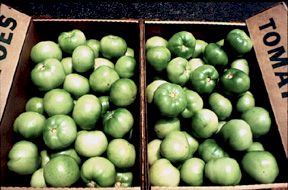 |
A shot of fruit in shipping boxes headed to your market. |
|
Ripening up so they are presentable and so you will buy them.
This is not always left to biology and chance. Ethylene gas is
introduced into the storage area to promote ripening. |
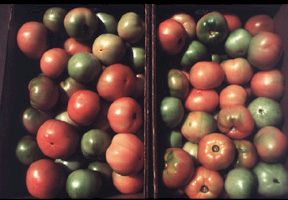 |
 |
Examples of where the bulk ends up. |
For
additional information about gardening with heirlooms, refer to "A
Case for Gardening with Heirlooms" and "Why
Should You Grow 'Heirloom Seeds' and Save Seeds?" |








